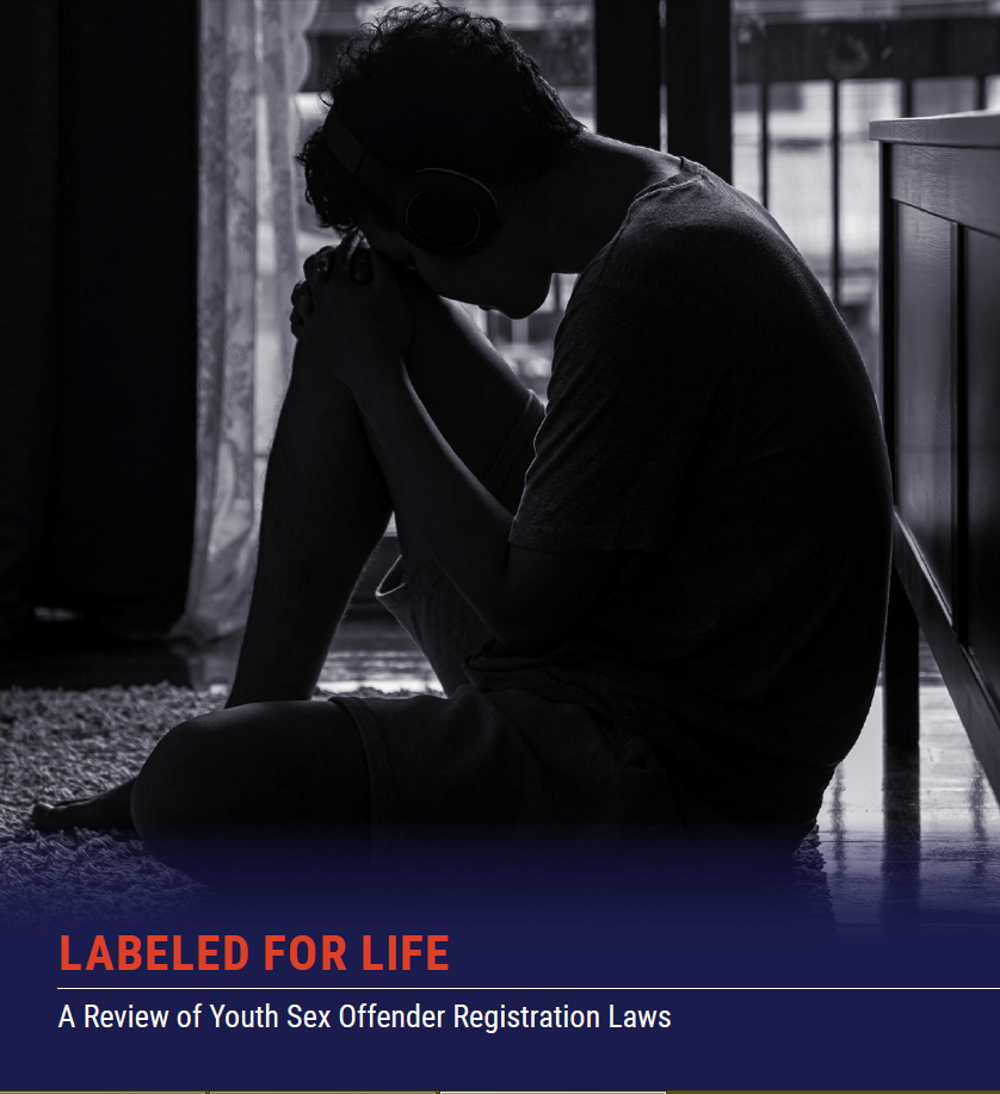![]() Jason was 14 years old when he met his first girlfriend, a 13-year-old neighbor of the foster family with whom he lived. After a few months of dating, his girlfriend’s mother walked in on the teenagers engaging in consensual oral sex and called the police. Jason was arrested and charged with child molestation. He was adjudicated delinquent in juvenile court and placed on the California Sex Offender Registry. Before he was old enough to drive, Jason was branded a sex offender on a public, searchable website.
Jason was 14 years old when he met his first girlfriend, a 13-year-old neighbor of the foster family with whom he lived. After a few months of dating, his girlfriend’s mother walked in on the teenagers engaging in consensual oral sex and called the police. Jason was arrested and charged with child molestation. He was adjudicated delinquent in juvenile court and placed on the California Sex Offender Registry. Before he was old enough to drive, Jason was branded a sex offender on a public, searchable website.
For more information on Community-Based Alternatives, go to JJIE Resource Hub | Community-Based Alternatives
Now in his 30s, Jason suffers from depression and has experienced homelessness. Despite earning a college degree, he cannot find steady employment. An internet search shows he is a registered sex offender.
Jason is like many others who struggle to lead a healthy adult life because of a juvenile adjudication based on unsurprising adolescent behavior. States across the country place children as young as 8 years old on sex offender registries for conduct that is otherwise developmentally normal.
Required by federal law, this label imposes barriers on young people’s access to education, employment and safe housing. It can devastate them psychologically with little benefit to the community.

Malik Pickett
Youth sex offender registration costs the public over $3 billion a year. Rather than investing in preventive programming and victims’ services, resources are routinely allocated to a carceral and punitive response. Meanwhile, research-backed social programming and community needs remain largely underfunded.
For example, in 2017 California spent $140 million to register and monitor 3,500 youth registrants. Yet that same year, the budget for prevention programs and victims’ services was only $46,000.
In addition to the high cost of registration, sex offender registries do not advance the public safety goals for which they were created. Only 3% to 5% of youth who commit sexual offenses are likely to reoffend, showing that registration wastes resources on individuals who pose little to no risk of future harm.
State rules hard to understand
Youth are required to register as sex offenders for a wide range of offenses, including consensual sexual relationships, sexting and public urination. These laws have a disproportionate impact on marginalized communities. Laws that criminalize consensual same-sex relationships disproportionately target LGBTQ youth. Racial bias in charging and sentencing can also lead to greater numbers of Black and brown youth on the registry.
A recent report by Juvenile Law Center shows that 39 states place children on sex offender registries. The registration procedure and consequences vary widely from state to state. Youth can be required to register for their entire lifetime in some states, which dooms them to a life on the margins.

Emily Satifka
Indeed, once labeled a sex offender, the stigma remains regardless of how long the registration period lasts; web-based information and databases often remain online and accessible even if the period of registration has long since ended. These registration laws completely disregard the rehabilitative purpose of the juvenile justice system.
Today, approximately 200,000 individuals are on sex offender registries for offenses committed prior to age 18. Registered youth face harsh restrictions that regulate where they can live, work or attend school. Some states prohibit such youth from residing with other children in the home, which can preclude youth from living with siblings or their own children or partner’s children. Registration can also prohibit youth from living within a church or school zone, effectively prohibiting them from practicing their religion or receiving an education.
State registration laws are complex and difficult even for most adults to understand. Yet youth are expected to understand and comply with the numerous restrictions and reporting requirements, despite the many practical challenges of doing so. States require youth to update and verify their information regularly, including when any information has changed.
If a youth is traveling between states or even within counties in their own state, they may have to report or register. When they are unable to comply with the complex and untenable registration and reporting requirements, they can face fines, incarceration and extended registration.
Additionally, many states require information about registered sex offenders to be posted on a public website, made available at local police stations or disseminated to the youth’s communities. This community notification often results in humiliation and social ostracism — even vigilante violence in some cases — and imposes a negative self-image upon the youth.
Children on sex offender registries are four times more likely to report a recent suicide attempt compared to nonregistered children who have engaged in harmful or illegal sexual behavior. Stigmatization from sex offender labeling frequently deprives youth of vital sources of psychological support at the precise time they most need community acceptance. And, in many cases, that support is not publicly funded or accessible to those who need it.
The draconian practice of youth sex offender registration imposes an unending loop of barriers and obstacles on youth without improving public safety. It also needlessly shifts resources away from important services such as sexual violence prevention and victim assistance. That is why the time is now to abolish the harmful practice of placing youth on sex offender registries.
Malik Pickett, Esq. is a staff attorney at Juvenile Law Center, where he advocates for the rights of youth in the juvenile justice system through litigation, amicus and policy advocacy efforts.
Emily Satifka, Esq. is a Zubrow Fellow at Juvenile Law Center where her work currently addresses the harms young people experience from sex offender registration, and inhumane conditions of confinement. Her legal career is focused on dismantling oppressive and violent systems through litigation, education and policy advocacy.

You’re labeled for life, what about the victim who was raped, beaten, murdered? You’re labeled for what you did. Own it.
My son called me and begged me to get him away from his mom before he runs away. So I left work and got him. We went across state lines to my mothers house, a 30 minute drive. I dropped him off and drove. back to work. My psycho wife pressed charges for parental kidnapping. Sorna requires anyone charged to register even if you arent convicted. I now have to register as a sex offender for 25 years. Good thing I’m labeled for life and thats keeping all my poor victims safe. Owning it.
Putting children on the sex offender registry is legalized child abuse! There should of never been a sex offender registry to begin with. Yes, there are people who have done horrible things, however once one does their time they should be treated bas equal members of Society. Children do not think nor understand like adults. Sex offender laws are also ableist to refusing to consider an individual’s developmental disability as well. It is things like these why some people say there are parallels between sex offender registration laws here in USA and Nazi Germany when Jews were forced to wear the yellow star of David. I honestly feel USA is as bad as what Nazi Germany was due to the labeling of many things as so called sex offenses even if it’s not an offense and putting little kids and developmentally disabled people on this registry as well with no consideration of age and disability! Even in the midst of COVID-19 and all the ongoing restrictions, it would not surprise me if authorities here in USA would go as far as to arrest and force babies to register as SO!!! I would also not be surprised if during the last 20 years, there could of been abandoned homeless 8 year olds abandoned by their families, communities, schools, foster parents, etc that died in middle of forests with their bodies unclaimed and left to rot by passerbys all due to the 8 year old being on the registry. HIDDEN EVIL AND ABUSE AGAINST A CHILD REGISTRANT GOING UNNOTICED IF THESE KINDS OF THINGS OCCURRED!!!
I am definitely not in favor of allowing children to have sex. But even I find strange to have to say that putting a child on a list of sex offenders is ridiculous. If two children are caught having sex they have to be warned and separated, not arrested and stigmatized.
I had no idea what so ever that a child could be placed on the list. I don’t understand how he was charged an she was not? The whole Juvenile delinquent an juvenile dependntcy courts are a bunch of bullshit ass backwards “under the color of law” non since that in all honesty from what I have witnessed in the past two years, play by their own set of laws an rules…for whatever suits them at the time.. an there is no repercussions for currupt judges, whoever the judge was that passed this registration onto that 14 year old BOY, should have, as a JUDGE known better. we the people need to stand up an stop allowing someone (taking in consideration of their job as a JV. JUDGE whom seems to be even less qualified than any one person whom is component & without prior knowledge of law) to handout judgement an punishment to us. The whole system is shot. There is NO “REFORMING” WE MUST BURN IT DOWN AN START AGAIN.
Convicted sex offenders love to play smoke and mirrors with fake statistics about those who re-offense rates. If anyone bothers to follow news about sex offenders they’ll find a constant flow of those who re-offend multiple times. All sex offenders should be on the registry so those living nearby have the information they need to advise children to stay clear of these monsters.
The only smoke and mirrors resides in your backside. Obviously you cannot read or understand sound research.
In reality, s*x offense reoffense rates are less than 1% annually. What “Val” claims is merely cognitive biased it has been trained by the mainstram media and victim advocates with an agenda to believe every registered person is a danger to society, and that is simply ludicrous. Val probably clutches it’s purse every time a black person walks by due to the same cognitive distortions.
The US has had a quarter century to reform this controversial public blacklist and it has failed miserably, and should be completely scrapped.
You obviously don’t know anyone this has happened to and just want to judge others when you have no clue wtf your talking about.
Hello, well to be honest you should do your homework. Because the sex offender reoffence rate is below 5% and that straight out of the study the US Government did in 1994. To find this study: http://www.Bjs.govRsorp94
This is a great report and I have added a link to the report from my own website.
Not everyone even knows that even very young juveniles can be added to the public registry. It is hard to fathom placing a child on the registry, yet it happens more than people realize.
Sandy Rozek (below) said it all. Unfortunately, we live in a society that is increasingly believing in an onslaught of disinformation — “They always re-offend” and “They are all paedophiles.” As Ms.Rozek alluded to, there is a wealth of research debunking these myths.
As for the cost of maintaining and monitoring the registry, the California Sex Offender Management Board found that this country is spending anywhere from 10 to 40 billion dollars per year. The minority of people who have committed a sex offense and are truly dangerous to society can be determined by use of empirically validated risk assessments. But remove the hundreds of thousands of registered citizens in this country with a one-time-only sex offense, who are working hard to reintegrate back into society successfully as law-abiding citizens in spite of the draconian, punitive laws that go with the registry.
It would be more cost effective if instead of using billions of dollars to monitor people who will never re-offend (commit another sex offense), use the money for preventative programs to be offered in schools, colleges, workplaces, and other public venues to stop the cycle of abuse, raise awareness of the consequences, identify support resources, provide more victims’ services, and ultimately restore families. Diverting funds to preventative programs is recommended by the California Sex Offender Management Board, the Illinois Sex Offender Management Board and the Association of for the Treatment of Sexual Abuses.
I agree with Dustin; juveniles shouldn’t be registered, but neither should anyone else. The registry has been in effect over two decades; many studies, both academic and governmental, have been done evaluating its effectiveness; it has failed miserably. It does not predict who will commit new crimes as 95% of new sexual crime is committed by persons not on the registry. It does not reduce re-offense; reoffense by those punished for an initial crime and then living in the community has held steady at, on average, 5% since long before the registry went into effect and is still at that percentage. It does not reduce new offenses; it does not protect children as virtually all sexual crime against children is committed by persons in their lives, their family members, peers, and authority figures, persons who are not on a registry. Two of the most popular (with the public) restrictions it has produced, residency restrictions and Halloween restriction, have ZERO evidence, based on a plethora of studies, that they make an iota of difference or produce an iota of public safety. If the registry fails to predict, fails to protect, fails to produce any increase in public safety, but instead goes against everything shown to increase public safety, interferes drastically in rehabilitation, and costs states many millions of dollars that could be spent instead on prevention programs that work and rehabilitation programs that work, WHY should the registry exist?
Pingback: Sex Offender Registration Doesn’t Help Victims, Hurts Young Offenders - Women Against Registry
People will find him on the registry and assume he was 30 and the victim was 13 just because it lists the victim’s age as 13. These are seriously misguided laws.
The sex offender registry in Michigan is under serious assault. With the current litigation, most offenders whose offense date predates 2012 will be removed from the registry. There is developing litigation to find the whole Michigan sex offender registry unconstitutional. Michigan has an attorney general that wants to remove most sex offenders from the registry. Hopefully, Michigan will lead this nation out of the darkness of these laws.
Good work by the Juvenile Law Center.
Great article!! Thank you, authors, for writing it and JJIE for publishing it!!
Excellent article, though I slightly disagree with the overall conclusion that juveniles shouldn’t be registered. Every single point made is equally applicable to adult offenders as well, therefore I would argue that the registry should be abolished en totem.